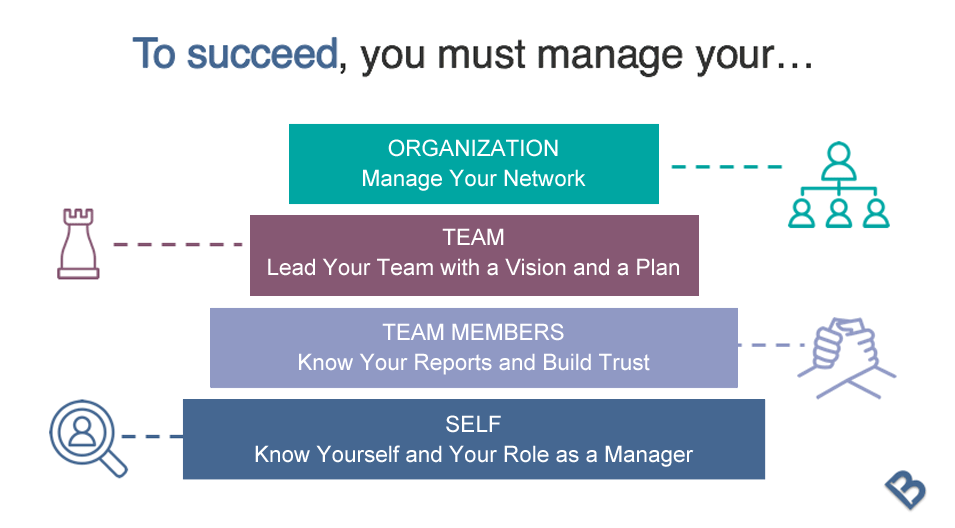The Four Pillars Of Better Management: #3. Team

Pillar of Better Management #3: TEAM
There is no “I” in team. You’ve heard that often. However, there is a “Self”, and we began this discussion of the four pillars by addressing the foundational issue of how you view yourself and your strengths.
Our second blog offered guidelines on how to use your personality traits and abilities to interact with the individual members on your team. Now it’s time to turn our attention to the role you play in managing the entire team as an entity. That’s the third pillar in becoming a Better Manager.

What’s the difference between managing team members, our Pillar Two, and managing the whole team, Pillar Three? You will have to work through some of these differences for yourself, because each situation is unique. However, in general, working with individual team members means you have to pay attention to each person’s strengths, needs and aspirations. As we explored in the last blog, your focus should be on treating each team member fairly, equitably and respectfully, building their abilities to contribute to the whole team.
In contrast, a team has to become a unified entity. It’s synergistic…the whole is greater than the sum of its parts. It must have collective norms that dictate how it operates. It must have an impact on the organization. It must have a leader…and that’s you. And one of the most helpful things you can do is decide on how you view the role of the team—your philosophy about the team, if you like. Perhaps you’ve always been a practical, hands-on kind of manager, who doesn’t spend much time thinking about philosophical matters. A Better Manager learns about team theories, and we can get you started with three:
Team Theory #1: Teams Need to Develop Norms and Values
Whether you have been hired to take over an existing team, or expected to create a team from scratch, you will need to think about its norms and values. Some experts think that those will emerge naturally, as the team members work together. For example, psychologist Bruce Tuckman concluded that teams have to go through stages of Forming, Storming, Norming and Performing…in other words, they have to get together and argue before agreeing on the operating norms that will make them into a high-performance team. Perhaps the idea of your team developing their own norms is a little worrisome, in which case you may prefer to decide on norms and then get buy-in from the team. However, you approach it, your team cannot face the world until it identifies its purpose and ways of working. Thinking through how you will build cohesion and commitment through shared norms and values is a very good way to start managing a team.
Team Theory #2: There are Different Types of Teams
Teams exist for different purposes, and they have different profiles and timelines. Understanding what type of team you manage will help you to choose a management style. For example, a team can be permanent, such as an HR team or the accounting group. Alternatively, you could be setting up a temporary team, to look after a special event or for short-term research. You may be leading a virtual team, which may mean that your team members are scattered worldwide and working remotely. Managing a virtual team required very different skills from leading a short-term, project-based team that is in the same building, and our Better Manager programs are available to help you develop those skills. Of course, the structure of the organization may determine the function of your team, and you may end up managing several teams, all with different functions. Being clear about the different types will help you to manage each one effectively.
Team Theory #3: The Culture of the Organization Affects the Team
Teams don’t operate in isolation, and the way in which the whole organization operates has an impact on how teams work. For example, in hi-tech companies that produce electronic games, the culture usually revolves around play, with gyms and football pitches often incorporated into their buildings. There are few rules around the work week, so most staff can start and finish when they want, and can come into the offices on weekends if they choose. In contrast, banks have a much more buttoned-down culture, in which work hours are set and obeyed, there is often a dress code, and the focus is more on work than play. When you take on a management role, be sure to check on the culture of the organization and what is expected of your team. If you like your teams to work regular hours with a sharp separation between work and play, then consider carefully about becoming a manager in the world of hi-tech.
In Summary
As a team manager, you have to have vision and a plan. it’s your responsibility to ensure that there are team norms that all the team members accept, and underlying values you reinforce through your own behavior. You must be flexible enough to adjust your style to suit different types of teams, and savvy enough to understand that the organizational culture has an influence on the way the teams function.
We turn our attention to that organizational culture next, as we review the role of manager in the context of the entire corporation. That’s Pillar Four.
Want to read about the other 3 Pillars?
Download the Four Pillars of Great Management Ebook!










